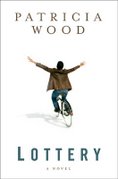OR A LOTTERY TICKET BY ANY OTHER NAME MIGHT BE CONSIDERED A GROCERY STORE RECEIPT...

7:44 AM and 76 degrees. Another chilly morning in Honolulu.
One of the most interesting things about having a novel published in other countries is working with translators. For those of you who are unfamiliar with how things work. This will be a quick tutorial (those familiar can skip ahead to the end-of-chapter quiz).
My novel was sold to Putnam and they bought only North American rights (English) so LOTTERY has been sold to other countries (Italy, Israel, the Netherlands, England, Sweden, Japan, Portugal, Korea, Spain, Finland, China, Taiwan, Russia, Romania...well you get the picture...)
When a country buys a novel they are responsible for doing the translation. And that's when it gets REALLY fun and fascinating.
I love language (of course I'm a writer!) so it's interesting to me to see how this is all done. Many times the author is unaware that the translation has been completed. For instance my Dutch publisher translated Lottery and I didn't know a thing! I sent a Dutch copy of LOTERIJ to my cousin Helge in Norway - who read it and pronounced it wonderful. The Dutch translator just made a minor alteration -- they changed my horse's name on the dedication page from "Airborne" to "Piloot". I like "Piloot" a lot and may name my next horse that.
My Swedish translator just needed to know whether my aunt (mentioned in my acknowledgments page) was my maternal aunt or paternal aunt as in Sweden there are distinct names for each. I thought that was remarkable.
My Korean publisher asked me to write a preface for my Korean readers and that was great fun...
But I have to say my most enjoyable experience so far has been being able to work with my diligent and brilliant Japanese translator Sayuri Kobayashi.
We both discovered that some of my words needed clarification. For example how would you all describe the Lottery ticket above in a way any reader anywhere could visualize it?
Washington State lottery tickets come in strips and you get two chances to win for each dollar paid. The ticket above is like the one Perry bought each week. It's five dollars worth of lottery tickets but just on one piece of paper. For those older people (like me!) the first lotto tickets were a single ticket that you scratched off and exposed your numbers...times change... and with the advent of computers the Lotto tickets changed as well...I digress...
And there were other things.
I had to explain when Gram expressed disgust "Mild Schmild!!! Education Schmeducation!"
Schmeducation is NOT in the English dictionary as Sayuri found out...
How would you translate that?!
Any of you who have grandparents who use colloquialisms or local turns of phrases can easily see how complex this can get. The translator then has a really important job to not only be true to the author's intent but allow their readers to understand in that particular language.
I have a lot of respect and admiration for translators who work with literature.
It's hard work. How do you translate slang?
And jokes!
How do you translate puns? And word play?
EGADS!! Wait. How do you translate this?
It's enough to make you want to pull your hair out...or shave your head... or tug your tresses...
Get the picture? um well er (Now how do I translate THAT!?)
So this post is to Sayuri san and all my other wonderful translators.
SAYURI SAN WA
SUBARASII HON YA KUKA
DESU!!!!
YOU ALL SO TOTALLY ROCK!!!
Now that can be understood in EVERY language!







































